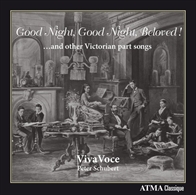
McGill University professor and Ensemble Vivavoce founding conductor Peter Schubert has pulled 17 Victorian part-songs from the school’s archives for an excellently produced album that only a singer can love.
- Classical Music 101: What Does A Conductor Do? - June 17, 2019
- Classical Music 101 | What Does Period Instrument Mean? - May 6, 2019
- CLASSICAL MUSIC 101 | What Does It Mean To Be In Tune? - April 23, 2019
R eleased by Montreal’s ATMA Classique label, Good Night, Good Night, Beloved! represents some of the greatest late-19th century hits performed by the Montreal Mendelssohn Choir during its 30-year history (1864-1894), according to Schubert’s album notes.
eleased by Montreal’s ATMA Classique label, Good Night, Good Night, Beloved! represents some of the greatest late-19th century hits performed by the Montreal Mendelssohn Choir during its 30-year history (1864-1894), according to Schubert’s album notes.
Sung unaccompanied, these songs tell their stories over multiple verses, each set with a certain amount of musical variation. The emphasis is on clearly expressing the text, underlining its emotional shifts in the music and, in most instances, using the voices as orchestral instruments.
The 13 professional voices are nicely balanced, blended and shaped under Schubert’s expert direction. But the music itself is so far removed from our 21st century sensibilities that enjoying it doesn’t come naturally.
The music is choppy and self-consciously clever as it lurches from effect to effect. It is the sort of music produced when composer is competing with composer in shows of creative virtuosity.
Given the popularity of community singing in the late 19th century (when Dancing With the Stars was something you did when the kerosene ran out), choirs and singers competed with each other on how deftly they could navigate the many technical shoals in these pieces.
It would have been a thrill, as a singer, to learn and master this music. Listeners who were also enthusiastic singers would have appreciated what was going on and perhaps even mentally compared this choir’s performances with their own.
But we don’t listen to or sing this music any more, so its fussiness is all the more prominent, if not downright obtrusive.
There are some nice examples of pieces written by Montreal choir conductor Joseph Gould (1833-1913), who published under the name Sydney Percival. His finest here is “You’ll Never Guess,” a setting of a sweet love poem by Frederick Langbridge (“I know a golden-hearted maid, For whom I built a shrine, A leafy nook of murm’rous shade, Deep in this heart of mine…”)
There’s also a pithy, hymn-like song published in 1884 by a forgotten Miss Bryson that allows for gorgeous, long, unembellished phrases as the choir sings, “Far out of sight while sorrow still enfolds us, Lies the fair city where our hearts abide. And of its bliss is not more wondrous told us. Than these four words ‘I shall be satisfied.'”
This album is a curiosity for the curious. You’ll find all the details here.
Here is a video from the recording session of one of the fussy pieces (but far from the worst offender), “The Sea Hath its Pearls,” by Italian-born British composer Ciro Pinsuti (1829-1888):
John Terauds
- Classical Music 101: What Does A Conductor Do? - June 17, 2019
- Classical Music 101 | What Does Period Instrument Mean? - May 6, 2019
- CLASSICAL MUSIC 101 | What Does It Mean To Be In Tune? - April 23, 2019



